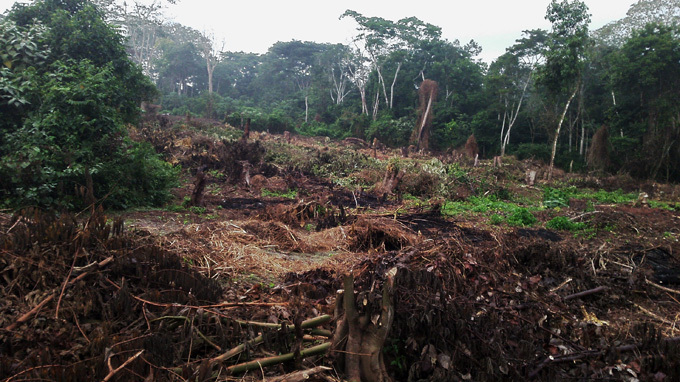Role of stakeholders in forest management
Natural resource management with specific focus on forests is a collective responsibility of every person and so Much as these agencies have mandates and obligations to fulfill, we can’t argue that it’s their sole responsibility.
By Rajabu Yusuf Bwengye
86,500 hectares (1.76%) of forest cover on average lost per anum in Uganda: The role of stakeholders in forest management
Often at times people think its government agencies with the sole responsibility of management of our natural resources and yet they benefit us all.
Natural resource management with specific focus on forests is a collective responsibility of every person and so Much as these agencies have mandates and obligations to fulfill, we can't argue that it's their sole responsibility.
All stakeholders for instance civil society organisations, community members, the media, local government, Judiciary, collaborative forest management groups among others all have a role to play in ensuring our forests are conserved. These roles I cluster them into three, Information sharing/ reporting, conservation role, enforcement role.
On the information sharing role it partakes of each and every one to report any illegalities occurring on the forests so that immediate action can be taken to halt any forms of degradation which if not undertaken the forests may completely disappear.
 Part of the degraded Bugoma forest. Photo/courtesy/ NAPE
Part of the degraded Bugoma forest. Photo/courtesy/ NAPE
I applaud the media and civil society for taking lead in reporting these irregularities that happen on our forests and so when such happens, it's incumbent on the other bodies to take actions which may be deterrent in nature to avoid future forest degradations.
-
The Judiciary for instance as a key stake holder should inteprete the law and within the confines of the law issue deterrent punishments to environmental degraders. Local governments are supposed to manage, support and regulate activities that impact on natural resource management should engage in best practices to ecosystem conservation and play a policing role against forest encroachers. Collaborative forest management groups should arrest culprits with, Impound illegally harvested timber with NFA, Patrol forests inform of a monitoring role
-
Media The media has a role of exposing illegal activities happening on forest, their work covers far and wide in creating awareness on the status of these forests. (fire, illegal logging, charcoal burning, illegal cultivation, illegal hunting, slashing fireline, etc) and their roles are clearly stipulated in the National tree planting act 2003.
-
Civil society has a monitoring role to play and this is done in lobby and advocacy to ensure that forests and other natural resources are properly managed and used in a sustainable way.
-
National Forest Authority- Has the overseer role to play in management of forest reserves which involves issuing of licences to carry out activities in the forests that do not compromise the health of these ecosystems, arresting along with the environmental police degraders.
-
Private sector- in performance of their activities that relate to development should not participate in deforestation or any practices that accelerate greenhouse gas emissions and in their corporate social responsibility support practices that contribute to forest expansion.
Unfortunately, majority of the private sector players have instead not lived to this conservation role thus compromising international Public goods (IPGs).mainly Water supply, food security and climate resilience. National Association of Professional Environmentalists (NAPE) has experienced this in its current engagements with private sector players such as Hoima Sugar Limited that has since the start of 2016 targeted degrading 8000 hectares of forest cover which is about 20% of the entire Bugoma forest reserve cover converting it into Sugar cane plantations.
Another prominent case that NAPE is pre occupied with is excessive natural forest degradation in Kalangala where Oil Palm Uganda Limited (OPUL) in collaboration with BIDCO BIDCO a Malaysian multinational have massively replaced natural forests with palm oil plantations and even when the courts of law gave a further injunction on continued expansion, the company is continuing with processes to acquire 10,000 hectares for nucleus (start).
With Such activities of Hoima Sugar limited around Bugoma forest, Kinyara Sugar Works around Budongo forest, Oil Palm Uganda limited in Kalangala and Buvuma, the issue of scarcity and depletion of International Public goods (Water supply, food security, climate resilience and biodiversity) in both Murchison, Queen Elizabeth,Kalangala Landscapes and in the whole of Uganda at large can only Worsen.
Perhaps the depletion of these important life supporting ecosystems such as Lakes and forests explains why Uganda's Gross Domestic Product (GDP) for the fiscal year Financial Year 2016/2017 slowed down from the 4.7% that was recorded in the Financial Year 2015/2016 to 3.9%.
Dr. Chris Mukiza, Uganda Bureau of Statistics (UBOS) a Macro Statistician noted in the New vision of June 7th 2017, that the agriculture, forestry and fishing industry dropped to 1.3% in the FY2016/17 from 2.8% recorded in FY2015/16 which is a pointer to accelerated ecosystem degradation. To reverse this trend, all stakeholders in ecosystem management including the private sector need to keen interest in sustainable ecosystem use and management.
The writer works with National Association of professional Environmentalists (NAPE)